AWARD-WINNING HOMEWORK HELP
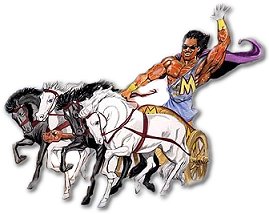
PROMETHEUS, GIVER OF FIRE
MYTHOLOGY'S ORIGINAL REBEL
PAGE ONE OF TWO!
(too much info and pix for one page)
The dark-winged hound of Zeus will come
the savage eagle,
An uninvited banqueter, and all day long
Will rip your flesh in rags, and feast upon your liver,
Gnawing it black.
Hermes, "Prometheus Bound", by Aeschylus
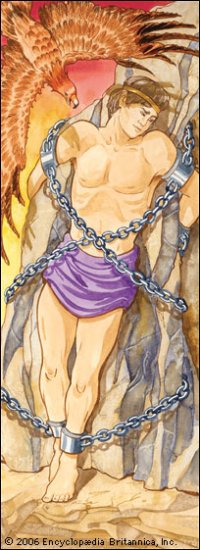
(C) Encyclopedia Britannica
| Only a few Titans, particularly Prometheus and his brother Epimetheus, fought on the side of Zeus, against their fellow Titans. |
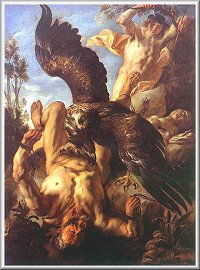 CLICK TO ENLARGE |
| Wise Athena taught Prometheus mathematics, navigation, astronomy, architecture, medicine and many other arts. That's how Prometheus got to be so smart. |
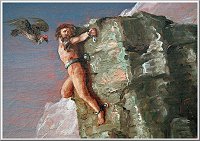 CLICK TO ENLARGE |
| Prometheus passed onto Man the useful arts taught him by Athena and looked with joy upon his creation. |
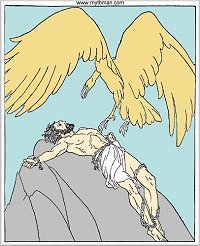 CLICK TO ENLARGE |
| Prometheus looked down with sadness upon his creation, watching them shiver in the cold and try to eat their food raw. Slowly they began to die and Prometheus could no longer sit idly by. |
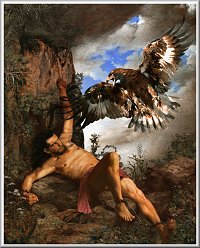 CLICK TO ENLARGE |
| (It must be noted that, along with all the advantages that fire bestowed upon humanity, it also brought many ills. Out of the flaming forge emerged cruel weapons of war, along with all the attendant miseries that follow the disruption of a simple way of life.) |
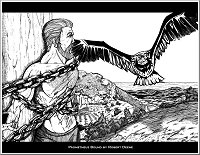 CLICK TO ENLARGE |
When Zeus, the king of the Olympian gods, was young and trying to
establish his rule, he was challenged by a group of ferocious Titans, who tried
to keep him from gaining power. A long and terrible war ensued, with all the
Olympian gods joined against the Titans, who were led by Zeus' father Cronus and
mighty Atlas.
After ten years of fighting, and with the help of the Cyclopes and the
Hecatoncheires (The Hundred-Handed-Ones), Zeus and his fellow Olympians defeated
the enemy. Only a few Titans, particularly Prometheus and his brother
Epimetheus, fought on the side of Zeus, against their fellow Titans.
You see, Prometheus was very wise - wiser even than most of the gods - and
foresaw the winner of the battle between the Olympians and the Titans. He
persuaded his impulsive brother Epimetheus to also fight on the side of Zeus
against gigantic Atlas and his army. Once Zeus emerged victorious he granted the
brothers some just rewards.
Zeus permitted Prometheus and Epimetheus to populate the earth with creatures
and humans. Epimetheus (he wasn't too bright and his name means "Afterthought")
foolishly gave all the good qualities to the creatures: Strength and speed, the
ability to fly, to stay warm in all conditions, to possess a keen sense of
smell, superb cunning and instinct, to live underwater.
Sadly, when it came time for Man to be endowed with qualities, there were very
few left. The scatterbrain Epimetheus had given away all the goods to the
creatures so that there was no quality to make Man a match for the beasts.
Desperate and sorry, he begged his brother for help.
Prometheus (he was wise and
his name means "Forethought") took over the task of creation and considered ways
to make humans superior.
When the goddess of wisdom Athena was born out of the head of Zeus,
Prometheus (or some say Hephaestus) assisted in the "delivery". Wise Athena then
taught Prometheus mathematics, navigation, astronomy, architecture, medicine and
many other arts. That's how Prometheus got to be so smart. Along with his
ability to foresee the future, that made him a formidable Titan.
Prometheus had created humans in the likeness of gods, using the clay and water
of Panopeus, and Athena had breathed a living soul into them. To compensate for
the lack of great qualities, which had foolishly all been given to the creatures
by Epimetheus, the wise Titan made Man stand upright like the gods, to be noble
and conscious, and to hold his head high, looking up at the heavens.
As yet there were no mortal women on the earth. That came later, as we will see.
Prometheus passed onto Man the useful arts taught him by Athena and looked with
joy upon his creation.
He felt badly, however, because when Man sacrificed to the gods, the best
portions of the animal were offered to the Olympians, leaving little for the
people. So Prometheus tricked Zeus into choosing one pile of offerings, cleverly
disguised to look delicious, but instead hiding fat and bones.
Zeus fell for the trick and impulsively chose the wrong pile, and from then on
humans got to keep the good and tasty parts of the animal offerings, giving to
Zeus the useless portions. This made the King of the Olympians real mad, so he
punished Prometheus, who was laughing at him. Zeus took fire away from Man -
"Let them eat their meat raw!" he shouted. "Let's see how your Men keep warm in
the winter!"
Talk about a bad sport! Zeus knew that he would seem ungrateful if he directly
hurt Prometheus, since the Titan had really helped him become King of Olympus,
so he did the next best thing - Swearing revenge, he punished humans by taking
away their fire.
Well, you know that didn't sit well with Prometheus. Daily he looked down with
sadness upon his creation, watching them shiver in the cold and try to eat their
food raw. Slowly they began to die and Prometheus could no longer sit by idly.
Prometheus arranged a meeting with Athena and beseeched her for help. The wise
and gracious Athena kindly revealed to Prometheus a hidden backstairs entrance
to Olympus and he gained entrance to the Palace of the gods, one of few to do
so.
Upon arriving he lit a torch from the fiery chariot of the sun god, as Helios
passed by. Breaking off a fragment of glowing charcoal, he hid the fire inside
the hollow of a giant fennel-stalk. Blowing out his torch in case he was spotted
by Zeus, Prometheus then worked his way down the side of Mount Olympus.
And what a perilous journey it was! The rebel Prometheus, who had taken such a
personal risk for Man, now was faced with getting the fire back down to earth.
The winds howled as he strode down the mountain, threatening to blow out the
coal, or huff it out of his hand. With each step he took, the Titan fully
expected to be seen by Zeus and to be struck dead with one of his killer
thunderbolts.
But Prometheus made it to earth and proudly gave the fire to the humans, who
were overjoyed, needless to say. Soon Zeus smelled the tantalizing scent of
cooked meat drifting up to Olympus from earth and when he looked down he was
outraged! There were the humans he had supposedly punished, happily cooking
their food and keeping warm around their fires. Zeus was furious!
"Then men were able to hammer iron into tools, and cut down forests with axes,
and sow grain where the forests had been. Then were they able to make houses
that the storms could not overthrow, and they were able to warm themselves at
hearth fires. They had rest from their labor at times. They built cities; they
became beings who no longer had heads and backs bent but were able to raise
their faces even to the gods."
by Padraic Colum, from "The Golden Fleece and the Heroes who Lived Before
Achilles"
(It must be noted that, along with all the advantages that fire bestowed upon
humanity, it also brought many ills. Out of the flaming forge emerged cruel
weapons of war, along with all the attendant miseries that follow the disruption
of a simple way of life.)
That was twice that Prometheus had made the King of
the Olympians look bad and this time Zeus was not holding back any punches.
Forgetting all that Prometheus had done for him in the war against the Titans,
Zeus had our hero arrested. He summoned from the Underworld the three ferocious
Giants, his thugs Gyes, Cottus, and Briareus, and had them take Prometheus to
the highest peak of Mount Caucasus.
On a huge rock the Giants bound the Titan with unbreakable adamantine chains,
according to the ancient poet Hesiod from his book "Theogony" (Birth of the
Gods):
To a high-piercing, headlong rock
In adamantine chains that none can break.
This is what the brutes told Prometheus, again from Hesiod's "Theogony":
Forever shall the intolerable present grind you
down
And he who will release you is not born
Such fruit you reap for your man-loving ways.
A god yourself, you did not dread God's anger,
But gave to mortals honor not their due.
And therefore you must guard this joyless rock --
No rest, no sleep, no moment's respite.
Groans shall your speech be, lamentation your only words.
Some say that Zeus's henchmen, Force and Power, were the ones who escorted Prometheus to the peak, and that the smith god, Hephaestus, was the one who applied the chains, albeit reluctantly. Here is Hephaestus, in Prometheus Bound by Aeschylus:
Evermore the burden of your present ill shall
wear you out;
for your deliverer is not yet born.
Such is the prize you have gained
for your championship of man.
For, god though you are,
you did not fear the wrath of the gods,
but you bestowed honors upon mortal creatures
beyond their due.
Therefore on this joyless rock you must
stand sentinel, erect, sleepless, your knee unbent.
And many a groan and unavailing
lament you shall utter; for the heart of Zeus is hard,
and everyone is harsh whose power is new.
PLEASE VISIT
PROMETHEUS PAGE TWO
TO CONTINUE THE STORY
& SEE MORE INFO AND PIX
CLICK HERE TO VISIT!
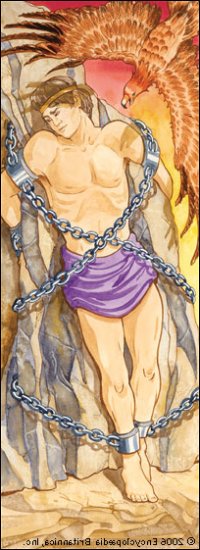
(C) Encyclopedia Britannica
| Zeus permitted Prometheus and Epimetheus to populate the earth with creatures and humans. Epimetheus (he wasn't too bright and his name means "Afterthought") foolishly gave all the good qualities to the creatures. |
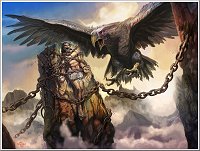 By Nathan Rosario CLICK TO ENLARGE |
| Prometheus (he was wise and his name means "Forethought") took over the task of creation and considered ways to make humans superior. |
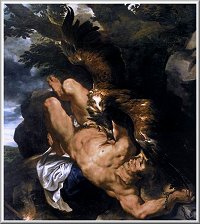 By Rubens CLICK TO ENLARGE |
| Zeus took fire away from Man - "Let them eat their meat raw!" he shouted. "Let's see how your Men keep warm in the winter!" |
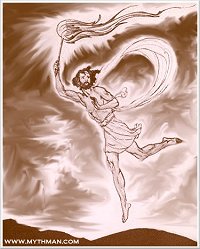 CLICK TO ENLARGE |
| The winds howled as he strode down the mountain, threatening to blow out the coal, or huff it out of his hand. With each step he took, the Titan fully expected to be seen by Zeus and to be struck dead with one of his killer thunderbolts. |
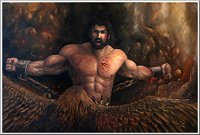 CLICK TO ENLARGE |
| But Prometheus made it to earth and proudly gave the fire to the humans, who were overjoyed, needless to say. |
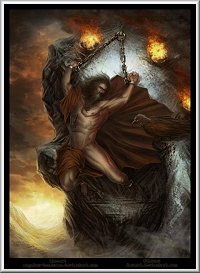 CLICK TO ENLARGE |
HOMEWORK HELP